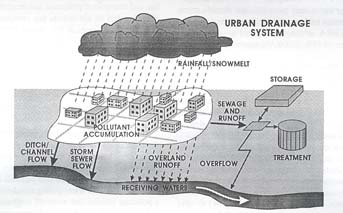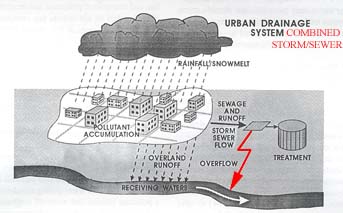| POLLUTION |
|
| One
unfortunate result of many people living, working, and manufacturing in a small area, as
happens in cities, is pollution. Garbage; automobile exhaust; gas, solid, and liquid
waste from industry; smoke from power plants; even dog droppings
can pollute the urban environment when experienced in high concentrations.
Pollution can become a health risk when water or soil is contaminated with dangerous
bacteria, poisonous chemicals, and heavy metals. In West Philadelphia, the treatment of sewage, or the byproduct of humans and human water usage, is an enormous problem. The solid and dissolved wastes in sewage must be separated from recoverable water. Sometimes the separated wastes can be used to advantage as a soil fertilizer, as this material is often high in minerals and nutrients. |
|
| In newer cities, storm drains in the street are not connected to sewer pipes that carry human wastes. When it rains, this water flows directly to nearby rivers or other bodies of water. This storm runoff picks up some contaminants from the street, which flow into the river untreated. |
* Stormwater Management for Transportation Facilities. p 54
|
| However, older cities have
a worse system: Cities like Philadelphia have a combined storm drainage and sewer system. This means runoff from the street flows into the same pipes that carry neighborhood sewage. When there is a lot of rain, the treatment plant cannot accommodate the increased volume of water and sewage coming through the storm/sewer. Any excess flows directly into the Schuylkill. This means some amount of raw sewage enters the river when there is a heavy rainfall. Increasing the ability of precipitation to flow into the ground, and slowing down runoff, help to reduce the occurrence of storm/sewer overflow. |
* Stormwater Management for Transportation Facilities. p 54.
|
|
REFERENCES
|


